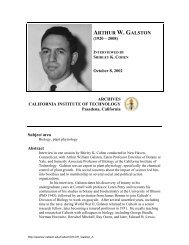Interview with Thomas A. Tombrello - Caltech Oral Histories
Interview with Thomas A. Tombrello - Caltech Oral Histories
Interview with Thomas A. Tombrello - Caltech Oral Histories
Create successful ePaper yourself
Turn your PDF publications into a flip-book with our unique Google optimized e-Paper software.
<strong>Tombrello</strong>–184<br />
TOMBRELLO: I’ll have to tell a story in that regard. I told it in public when I interviewed Charlie<br />
Munger for the DuBridge Lecture a few years ago. Years earlier, I was at Los Alamos for the<br />
summer. A friend and I were bicycling up in the Jemez Mountains. We were talking as we<br />
gritted our teeth and climbed this particular hill. He was talking about competition, worrying<br />
about the competition getting ahead. I realized there was some kind of disconnect, and I said,<br />
“Jim, you can’t be talking about Soviet Union.” He said, “Of course I’m not talking about the<br />
Soviet Union. I’m talking about those guys at Livermore. We just can’t let those guys get ahead<br />
of us.” And I thought, “We’re paying taxpayer money to compete <strong>with</strong> ourselves, and the people<br />
who are doing it have written off the Russians as being hopelessly clunky.” [Laughter] A very<br />
interesting phenomenon.<br />
It was deliberately set up that way by [Edward] Teller to motivate technological advances<br />
in the field, but it became an end in itself. Our national labs compete <strong>with</strong> one another, and<br />
we’re going to have to get around that. There have got to be, in my opinion, a few hundred<br />
weapons in the stockpile rather than thousands. They still have not addressed the problem of the<br />
so-called tactical weapons, the small weapons, most of which are probably useless in any<br />
conceivable conflict.<br />
ASPATURIAN: Are you talking now about this country or also about—?<br />
TOMBRELLO: We’re also talking about tactical weapons that are abroad, because they’re not<br />
covered by START or SALT. But I think both sides agree that they’re probably not as useful as<br />
one might think and that they are destabilizing. They’re also weapons that could diffuse out of<br />
the system. That’s the other thing about having fewer—you can guard them better.<br />
ASPATURIAN: That’s right. One hopes.<br />
TOMBRELLO: The people who saved us in many respects were Senators [Samuel] Nunn [D.-Ga.],<br />
and [Richard] Lugar [R.-Ind.], <strong>with</strong> the Nunn-Lugar Act, which, as the Soviet Union came apart,<br />
found U.S. money to move people who were bomb designers into other occupations that paid<br />
them salaries and helped the Russians secure the weapons better. It was a good thing it got<br />
passed—very important. It stabilized a system that was very precarious. The Russians had a<br />
philosophy of worrying about people stealing weapons from the system. They were very poorly<br />
http://resolver.caltech.edu/<strong>Caltech</strong>OH:OH_<strong>Tombrello</strong>_T

















